- Home
- David Guterson
The Country Ahead of Us, the Country Behind Page 8
The Country Ahead of Us, the Country Behind Read online
Page 8
“You have to get rid of these piranhas,” said his father. “And I’m not asking you. I’m telling you.”
“How come?” said Paul.
“Because they’re strange,” said his father. “That’s why.”
“What’s strange about them?”
“They’re just strange. They’re strange, Paul, you can’t have them in your room like this. They—”
“Come on,” Paul said. “Please?”
His father shook his head. “You have to get rid of them,” he said. “That’s all there is to it.”
“No way,” Paul said. “Come on, Dad.”
His father leaned around the doorjamb. “Kim!” he yelled. “Come down here!”
“Come on, Dad,” Paul said one more time.
His mother came in. She looked at each of them, one at a time. “Now what?” she said. “What is it?”
“Confrontation,” said his father. “You’re better at it, Kim.”
“He’s twelve,” said Paul’s mother. “You can handle it.”
“I’m keeping my piranhas,” Paul said.
“No you’re not,” said his mother.
“Yes I am,” said Paul. “They’re not hurting anything.”
“Listen,” said his mother. “The piranhas are going. Is that understood? Just remember who paid for all those fish in the first place. I paid, I’m going to make the decisions.”
“I wanted to use my Christmas money,” Paul said. “All right, fine—I’ll get rid of them. Then I’ll buy some more with my own money.”
“No you won’t,” said his mother. “This is it with the tropical fish, Paul. You’ll have to find a more appropriate hobby.”
She went over and pulled the plug on the electric pumps. The bubbles stopped running through the filters.
“Leave it unplugged,” she said. “I’m serious.”
“Maybe Paul can take them back to the pet store,” said his father. “Wouldn’t that be better?”
“Paul can resolve this however he sees fit,” said his mother. “Just as long as he gets them out of here.”
There was silence then. Paul curled up on his bed. He pulled the pillow over his head, tucked his knees against his chest and swore under his breath at both of them.
“Did you hear me, Paul?” said his mother.
“Get out of here,” Paul yelled. “I mean it.”
* * *
Paul, in the morning, put the piranhas in the hot tub. They died immediately; he left them there.
He told Ken about it. They skipped school in memory of the dead fish. “My parents suck,” Paul said.
“So do mine,” answered Ken.
“I hate them,” said Paul. “Big time.”
“Same here,” Ken said.
They walked across the golf course together. They cut across a sand trap to the ninth green. It had begun to rain; no one was golfing.
“I just want to kill them,” Paul said.
“I want to kill mine, too.”
“What’s the best way?”
“Poison their food.”
“Cut them up with an ax while they’re asleep.”
“Cut the brake line in the car.”
“Shoot them in the back while they’re taking a shower.”
“We can trade,” Ken said. “Like on television. You kill mine while I kill yours.”
“I know,” said Paul. “With a chainsaw.”
They sat on a bench. It was raining harder now. Cars went by on the road. Paul imagined how it might be to kill his parents. The thought caused him only minor remorse, because he felt certain they deserved it, somehow.
“Let’s head over to the arcade,” Ken said. “Maybe someone else’ll be there.”
Paul got up and pulled the collar of his coat against his neck, but the rain was inside of it now.
“All right,” he said. “Let’s.”
Three Hunters
I came down through Echo Canyon, wading and rock hopping in Echo Creek, and the Game Department man who had spoken of silver trout was a liar by now and the creek screamed as it fell toward the Columbia. It was too hot, the water rode too low between its banks—even the black flies had finished hatching. The fish—all of them—had gone somewhere else. They were not in the creek anymore. They had disappeared from the upper lakes. They had gone to a place no one could walk into. I dreamed of that country while I followed the watercourse down between cracked rock walls and the leaves far above shook in a hot wind. Nothing else touched me; I forgot to watch anything else. In my dream I had enough to do, filling my creel full of silver trout. They were big ones but not much for eating and they fought much harder than the real ones ever did. They never got away from you either.
I was sixteen. There was nothing else on my mind.
When I had the dust path under my feet again my feet were surprised. The dust made my nostrils tighten up. A few pine needles that had gone rust-red in the late heat floated past me. I hiked through a grove of birches where the path snaked to avoid falling into Lost Lake and the wind brought the dust up around the backs of my waders. The birches were getting short on leaves.
For September, late September, it felt hotter than I could remember, but everyone talked about Septembers I didn’t know about that might have been hotter—even my mother, who seemed to have no memories of anything and never spoke about the past to us or anyone else. Places, people, days, months, whole years had hardened inside of her until there were no good juices left, until there were only the bitter ones. She was a fierce woman, keen, her eyes like the points of arrows, her hair as black as her eyes. The town whispered about her, about her still mouth, her silent eyes, her past, but she showed no interest in words anymore. Her luck had been bad. She had nobody left to blame. My father had been smart enough to disappear before she killed him slowly, though nobody I knew looked at it in just that way. My mother didn’t, for one; she insisted it had all been his fault, if she touched on it at all, that he had been too hard to be a husband. But I never listened when she spoke about him.
What did I care, though—about the town, my mother, or even the Game Department man who had lied to me through the mustache that crawled over his filmy teeth? I was here. One of my dream fish jumped out of the white sky. I watched the drops of water spiral away from his silver flanks, the sun so strong on them it hurt my eyes, then line spun away from me and then the path reappeared, dust and curling leaves, under my feet where it belonged.
A crow rasped somewhere in the woods as I came down over the cliffline, speaking to no one, to the wind. I followed a game trail now, I was no longer in the path; loose stones my waders kicked up bounded down to the shore of Lost Lake, disappearing in thick clots of thornbush as they flew along. I stopped and rifled a couple of big chunk-rocks into the water, inspecting the splashes they made closely, but none of them could satisfy me. They were only splashes—nothing more. The water settled back over them as though nothing had ever happened and the lake ignored me completely.
I slapped across Lost Creek, waders flying up to kick the creek-bed stones, and made my way into camp through the old fir forest that had never been cut because of the cliffs.
“Are you hungry yet?” Lane said to me.
He was sitting in the packed dirt next to the firepit, stripped down to his underpants, dealing solitaire with an air of great seriousness about him, as if solitaire held something no one else could ever know about, as if solitaire were some kind of ceremony. His face looked bruised and bloody, but the only thing he’d wrestled with had been the blackberries on the far side of the lake.
“Roy?” he said.
I frowned at him, at his underwear, at his purple teeth.
“I’m hungry,” he said into his cards.
Lane was twelve. He had no memories of our father, who had left us—I thought—to save his own skin. He was thin, too; his long shoulder blades plowed the air behind him like a pair of dorsal fins. A lean kind of tension gave stiffness to his limbs, as though he
were ready to jump into the woods at any moment. An alertness ran through him, but he was too young to contain it. It overflowed at his eyes.
I had one memory that was vivid, though: my father striding up a broad stretch of the Little Nelson River in his chest waders, canvas short-vest and spread-brim Stetson while I watched him discreetly from my perch on a boulder below the cutbank. He was like a giant barreling steadily upstream, fly rod in hand and smiling stiffly as he crashed toward me, and then with a hand that was powerful and certain he scooped me up beneath his underarm and we traveled together through the spring runoff, lunging toward the bend in the watercourse.
I rested my fishing rod against a pine bough. There were new scratches on the reel spool cover from the rock walls in the canyon. I loosened the straps on my daypack and set it down beneath a tent line. Everything in camp looked familiar and smelled of fir smoke, even Lane.
“Who’s winning?” I said.
He brushed a mosquito from his forearm with the queen of spades.
“Nobody wins when you play this, stupid,” he said.
“Then why are you playing?”
“I don’t know.”
I sat down. I fought my waders until they had no choice but to let go of me, then dumped a half-quart of water out of each.
Lying back beside the stones of the firepit I felt sleep coming, and my dream of the country where the fish had gone slipped through a crevice and returned. It was a silent bit of country first of all; nobody fished there but me. When the big silvers jackknifed past the surface of the water their gill covers shone and the parr marks along both flanks rippled and when you brought one alongside, played out and puffing, the flat serene eye of the fish spoke to you softly. There were no mosquitoes in the dream. There were no other fishermen. There was nothing you had come out of and nothing you were going into, either: no home and no future. Winter never came in the dream—the fish ate always and the water stayed temperate. The fish were not plants from the State Hatchery, either; the Game Department man had nothing to do with them; they were all wild, natives: they went with the dream.
I had one; I had my forefinger hooked under the gill cover of a sleek silver male and I was looking down through the perfect fragile young eye that told nothing, that did not even seem concerned with death or exhaustion because those things were not real—
“Somebody’s coming,” Lane said, and threw his cards in the dirt.
We sat there, Lane in his underpants, me in my wet socks, and watched the three hunters work their way across the flat. Lane sprang up and got his jeans on, then sat down again on my side of the firepit.
“Zip your pants up,” I told him.
They carried big game guns, bolt-action rifles that were impossible not to stare at, neither in cases nor lashed to their loads but instead out and at hand. One of them had a tumpline across his forehead, but the others were bent under the weight of their packs. You could not make out what the stink was that traveled with them—sweat, grease, musk, tobacco, stale whiskey, sour leather—but it was powerful enough, and it arrived before they did. They were downwind hunters, like all men.
“Hello!” I said when they were in our clearing, standing up in my wet socks to meet them.
“Hello.” The one with the tumpline looked at Lane. “What happened to your face?” he asked.
“Nothing.”
“He’s been eating blackberries,” I said.
“Blackberries?” the hunter with the tumpline said to me. “Blackberries? Are you kidding me?” He turned to the other two, who were grinning from under their heavy loads.
“Did he say something about blackberries?” one of them said.
“Maybe we didn’t hear him just right,” suggested the other.
“Let’s try this again,” said Tumpline. “Did you say something about blackberries?”
“I guess so.” My jaw felt tight. “I don’t know.”
Tumpline let go a sigh of disgust.
“Maybe we better just forget about it,” he said, shaking his head at me sadly.
He twisted himself free of his pack and laid his gun down. The others followed suit. One of them wore camouflage pants; his gut hung down over the lip of the waistband like a cow’s udder. I looked for his eyes, but they were three-quarters hidden under pasty lids. Pimples and sores festered across his bare back; thorn cuts—mottled streaks—crisscrossed his forearms; dark blotches stood up where the mosquitoes had nipped him. He looked uncomfortable, as though his body composed some private form of torture.
The second one sprawled out over his pack with his rifle next to him and stared silently at the tops of the trees. Crisp blond hair rose out of his head like the bristles of a stiff brush, greased into a whipped tuft at a widow’s peak that grew slightly off center. He looked to me like a gigantic choirboy—someone who had grown absurdly large but had changed in no other way since the age of twelve. A scatter of blond peach fuzz clung to his chin; his cheeks were frosted with nearly invisible cottony whorls: otherwise he looked twelve and no older. He went shirtless beneath his combat vest and his muscles—the chest swelled too far, the neck cords thick and squat—seemed unreal and disproportionate, like sacs of air beneath a layer of plastic skin.
Tumpline, though, was the bulkiest of the three. He had a lumpy, stubborn appearance—everything about him was huge but unsolid. His sideburns, a deep black-orange color, grew long and pointed toward the corners of his mouth. Sweat glued his hair down over one ear; the grains of his beard stood up like a mat of dark seed grass attached to his face. His lips, blistered and meaty, reminded me of night crawlers. He had gleeful, large-socketed eyes.
It occurred to me that, for some reason, big men always stuck together. They like it that way. They understand each other. Nobody else knows how they feel.
The fat one picked up my rod. He pushed up the bail arm, tightened the drag down, and began to practice his casting moves under the trees.
“You got that all wrong, Frank,” Tumpline said. “You’re supposed to use that near water.”
Frank mumbled something to himself.
“Ain’t that right, Big Guy?” Tumpline asked me.
“Sure.”
“Sure,” Tumpline agreed. He picked up a few of the playing cards and held them out for the blond one to see.
“Cardsharks,” he said.
“Cardsharks,” said the blond one, still staring off into the treetops.
Tumpline dropped the cards, one by one, in the dirt. “Ever been to Reno, Big Guy?”
“No.”
“What about him?”
Lane shook his head at the forest floor.
“Never been to Reno,” Tumpline said—to himself, or to no one. He picked at a molar and looked over our camp for the first time.
“Where’s your catch at, Big Guy?”
“I didn’t catch any.”
Tumpline’s plump, raw lips parted. “Big Guy,” he complained. “Big Guy, come on now. Do I look like an asshole?”
“No.”
“Sure he does,” the blond one threw in. “He looks like an asshole.”
His eyes never moved from whatever he had noticed in the tops of the trees.
“Now wait a minute.” Tumpline scratched at the root of one sideburn with an index finger. “Just a minute here. I don’t believe this. You hiked the fuck up here—am I right?—I mean you hiked all the way the fuck up here”—he stood and flopped his arms at the sky; his mouth moved but no words came—“ … it’s all too incredible, Big Guy,” he finally said. “I mean it’s just too fucking-A incredible.”
The blond one stood up now and unzipped his pants calmly. “I told you he was an asshole,” he said, and took a leak with his back to us.
“You.” Tumpline was pacing now. “You—Little Big Guy. I want you to tell me the truth. I want you to think hard for a minute here and tell me what the truth is.”
“Okay!” Lane answered.
“Good.” Tumpline saluted for some reason, snapping it
off his forehead so that the salute ended two feet in front of his eyes. “Very good. Excellent. I can see you want to cooperate. It makes me feel good when I see that.”
He double-stepped in a sort of dance around the firepit and crashed down on the ground next to Lane.
“Little Big Guy,” he began, “you are my friend. Don’t ever forget that. I don’t want you ever to forget that.”
“Okay,” Lane said.
“Okay?” asked Tumpline. “Okay. Now listen. It makes me feel good to sit here next to you. It makes me feel I can trust you—do you know what I mean? Don’t answer that. Just sit there. Don’t even think about moving. Just answer my question. I need you to answer me. I need the truth, for once. I need to know where the fish are up here. I need your knowledge, everything you know, Little Big Guy. Don’t hide it from me. Don’t be selfish, good buddy, share it. Be cool. Tell me what I need to know.”
“I don’t know anything, though,” Lane whimpered.
Tumpline slapped his forehead. “I’m disappointed in you,” he said gravely. “I’m very, very disappointed in you.”
He rose and stepped away from us like a man who’s been bitten by a snake, then turned suddenly beneath the silent firs.
“Leave me alone,” he cursed us now, his eyes bubbling and strange. “All of you. I mean it. I have to think this all through … what I’m going to do and everything. There are big, big decisions to be made. You haven’t heard the last of me, you assholes.”
“Shut up,” the blond one said coolly.
Tumpline stumbled away toward the lake. When I turned to check on Lane he stared back wildly, his face shimmering with addled blood.
“Everything’s okay,” I told him.
The blond one unzipped a side pocket on his pack and brought out a tin of Copenhagen. He tamped a chew in against his gums, then leaned back again with his hands behind the base of his neck.
“Don’t mind Mickey,” he told us. “His brain don’t work right anymore.”
“All right,” I said.
“I know the dude,” he said through his chew. “He got his mind blown—can’t think straight anymore—but he ain’t dangerous. Sometimes you just have to put up with this shit from him, that’s all.”

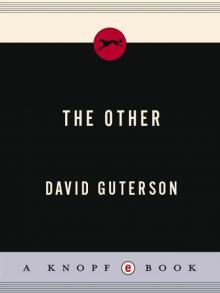 The Other
The Other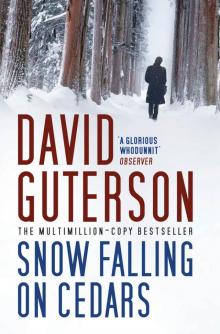 Snow Falling on Cedars
Snow Falling on Cedars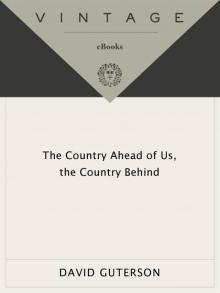 The Country Ahead of Us, the Country Behind
The Country Ahead of Us, the Country Behind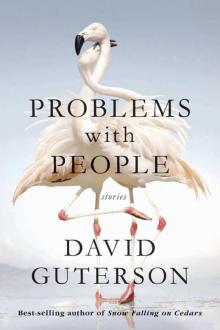 Problems With People: Stories
Problems With People: Stories East of the Mountains
East of the Mountains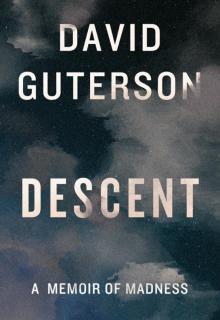 Descent: A Memoir of Madness
Descent: A Memoir of Madness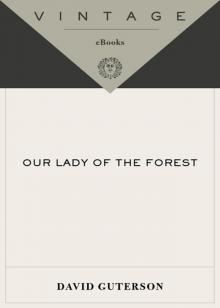 Our Lady of the Forest
Our Lady of the Forest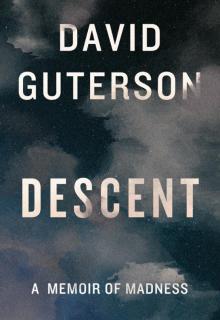 Descent
Descent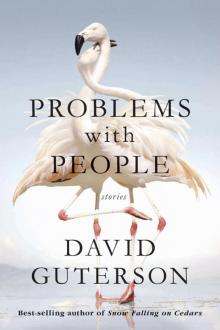 Problems with People
Problems with People